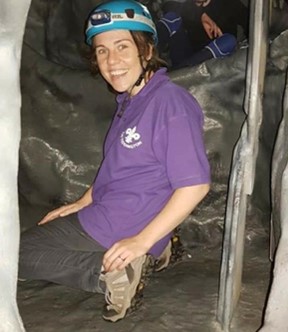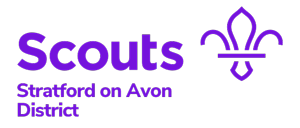and you thought volunteering for Scouts was only tent building and camp fires!
 I work for Severn Trent, in waste water! But I don’t have to wade through it, that’s done by machines.
I work for Severn Trent, in waste water! But I don’t have to wade through it, that’s done by machines.
How did you hear about volunteering for Scouts?
I saw a poster in the Tiddington post office when I was on maternity leave. I’d moved to Tiddington just before I had a little person and I realised I didn’t really know too many people locally. I’d been a scout growing up (and my Dad was a Scout Leader), so it seemed like a natural choice.
Had you ever done any volunteering before?
In Wales, where I grew up, I volunteered through a Scout scheme for a Scout award, which would be the Chief Scout Gold Award these days. I kept volunteering after the award was finished because it was so much fun!
You’re obviously busy with a family and work so what keeps you volunteering for the Scout Association?
It’s the opportunity to do lots of things that are really different. Also to see the Scout Association develop and change over the years. But being able to do all sorts of different things, things that I wouldn’t have done if I hadn’t been involved in scouting.
Anything in particular?
Yes, the yacht sailing in the North Sea. And even stuff you wouldn’t hear about normally. We have talks given by people from all walks of life that you wouldn’t hear about if you didn’t have someone in your sphere of work, family or friends, like the airline pilot who gave a talk.
And some of the camping activities, we get to do with the Scouts and the skills you build up, those are some of the main things. If you joined a club or volunteered in a specific thing, let’s say, a cattery or something like that, then that’s what you would do every single time, whereas every week at Scouts it’s different.
This week, Scouts are learning a bit about ropes as we are hoping to go on a winter camp. We’ve spent some time planning where we want to go, what we’re going to eat, what we’re going to do and what we need to take with us. We’ve already taken the next step because we went to Compton Verney to do some orienteering.
Any standout moments?
When the groups get their Chief Scout’s Gold Awards. To get to that, they have to achieve six Activity badges and the nine different Challenge award badges including:
- Adventure Challenge Award
- World Challenge Award
- Creative Challenge Award
- Expedition Challenge Award
- Outdoor Challenge Award
- Personal Challenge Award
- Skills Challenge Award
- Team Leader Challenge Award
- Teamwork Challenge Award
It’s a culmination of three to four years of scouting, so to get to that point the challenges are really quite significant. For Cubs it’s a silver and for Beavers it’s Bronze so it’s the same sort of format and I’m really proud of them.
What are the main skills you think are important for volunteering in Scouts?
Being open-minded to loads of different ideas and being able to adapt to diverse people as there are different levels of ages and learning in Scouts. And being able to listen.
Would you say you have to be like a teacher?
Yes and no! You have to be more like a team coach and help your group to think about how they’re going to do something or how they’re going to work through something. Also, the older Scouts are there to help the younger ones to deal with the challenges and that’s a growing experience for them. Plus, we share it all, it’s not like you lead every session. What happens in Scouts is a team effort, so it’s really helpful because you play to your strengths.
Who plans the activities and talks?
The volunteers do get-together in a local pub and brainstorm ideas but mostly we let the groups come up with the ideas and think about their own programme, for example, we’ve had the Stratford Beekeepers come in. There is a checklist of topics to cover but this can be revised if dates don’t come up as planned, like availability of people, etc. We decide on what we’re going to do and we then build our programmes based on what the scouts want to do, so we’re covering all badges and the Challenge Award badges. If you do that then you should have a balanced programme because of the very nature of the badges being so varied.
There’s usually a fun activity at the end of the term, like go-carting but if we left it solely to the scouts we’d be go-carting every week!
What qualifications do you need to be a volunteer with Scouts?
Once you volunteer, there is training to do, which you can spread out over three years so it’s manageable. When this training is finished, there are only a few modules you have to take refresher courses on, like Safeguarding, GDPR for handling data and First Aid…all of the ones you’d expect to refresh your knowledge. But you get help.
The training covers all the things you’d need to know, including working with a group, working with other adults. These particularly help if you’re coming into it as a younger adult or you haven’t had a role where you’ve had to explain things to a group of people.
I spoke to a Young Scout Leader recently who has now become a Scout Leader and she thinks the only reason she was offered the job she’s now working in, was because of her involvement with Scouts. She didn’t think she would have had enough experience compared with the other candidates for the job to get anything at the moment. It’s the perfect thing for young adults at that stage of their lives when they’ve got a bit of time to do these things and try new things.
Have you brought anything in the way of hobbies or your work experiences to Scouts?
Yes, I go kayaking…slightly different now I’ve got a child…to accommodate my family, we bought an inflatable kayak suitable for three. I go cycling, walking, and running…things the Scouts like to do as well. And my family and friends know I love what the Scouts do, I always talking about the things we’re doing and they find it interesting.
My job involves water treatment and my Scout groups have all learnt everything about water treatment works! I recommend when you first talk to your group about a subject, to feel really comfortable, it’s definitely worth bringing your own knowledge and expertise from work.
Do people know each other before they join Scouts?
In Stratford it’s nice because each Scout group has a mix of schoolchildren so the groups are able to mingle and make friends with different people from different schools, which they wouldn’t in school groups and it builds their confidence. And there’s a mix of male and female Scout leaders which really helps from a role model perspective. I hardly knew anyone around here so it’s really good to make friends this way.


